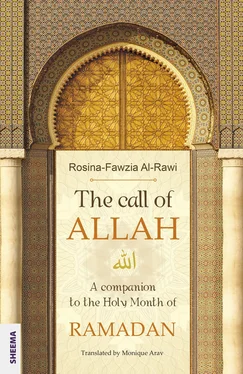Imam Ali answered, “It is a good deed, but this is not the one.”
Another one replied, “and who, when they have committed a shameful deed or have [otherwise] sinned against themselves, remember God and pray that their sins be forgiven – for who but God could forgive sins?” (3:135)
Once again, Imam Ali answered, “It is a good deed, but this is not the one.”
The congregation fell silent. “Why are you quiet?” asked Imam Ali.
“We have nothing to add!” came the answer.
Then Imam Ali spoke: “I heard my beloved Prophet  say, ‘The verse of the Qur’an which gives most hope and trust is the one where Allah tells us: ‘And be constant in praying at the beginning and the end of the day, as well as during the early watches of the night: for, verily, good deeds drive away evil deeds. ’” (11:114)
say, ‘The verse of the Qur’an which gives most hope and trust is the one where Allah tells us: ‘And be constant in praying at the beginning and the end of the day, as well as during the early watches of the night: for, verily, good deeds drive away evil deeds. ’” (11:114)

This touching narrative shows us how essential prayer is for us human beings, this daily connecting and embedding, and how it builds the core of our faith.
All the pillars of faith are reflected in the ṣalāt. While we pray, we repeat the shahāda ; while we pray, we step out of the world of activity, of making a living, and we give of our time, which corresponds to the zakāt ; while we pray, we fast because we abstain from all food or drink; while we pray, we turn to the Ka‘ba, our spirit and our heart on pilgrimage, our bodies facing towards the Ka‘ba. While we pray, we unite our faith, both inner and outer orientation.
In Arabic, the ritual prayer is called ṣalāt (in Turkish and Farsi: namaz) and ṣalāt comes from the root ṣ-l-w which means invocation, compassion, connection, union.
Ablutions, wuḍū’, carry the act of separation – separation from the outer world – whereas the ritual prayer, ṣalāt, carries the act of union – union with the Divine reality, Al-Ḥaqq.
Ablutions, wuḍū’, purify the body and the senses from the outer, worldly activities, in order to consciously prepare them for the union.
Imam as-Sadiq said: “The action most beloved of Allah is ṣalāt and this is the final instruction given to us by the Prophet  .”
.”
When Allah says in the Qur’an, “for We are closer to him than his neck-vein” (50:16), this means that ṣalāt is not meant to take us closer to Him, but to make us more sensitive, to open our hearts and to remind us how close to His presence we already are.
Ṣalāt lifts us out of the ephemeral treadmill of everyday life, elevating our consciousness to the eternity of our soul. Ṣalāt embeds us into the natural movements of the universe. When we pray, we are connecting ourselves with the continuous praising of all creatures, thus experiencing Allah’s eternal kindness and mercy.
When we prostrate, sujūd, for the first time, humbly laying our head on the earth, we remember that we came from dust; when we prostrate for the second time, we remember that we will die and return to dust; and when we lift up our head again, we are reminded that we shall be resurrected in a future life.
The deep meaning of ṣalāt is to set our self aside and to open our heart to an intimate dialogue with Allah. It is consciously stepping into Allah’s mercy and explicitly making space for our soul.
If we were to enter into a flowing stream five times a day, would there be any dirt left on our body? Ṣalāt is akin to this cleansing stream, it purifies us of our transgressions, our forgetfulness and our attachments.
God does not need us to pray for Him; through our prayers and ṣalāt , we are granted support and stability, awareness and energy, protection for our souls and vigilance over our self, “for, behold, prayer restrains [man] from loathsome deeds and from all that runs counter to reason.” (29:45)
Time and time again, ṣalāt reminds us of what we truly are and why we are here. Ṣalāt delivers us from the burdens of life, relativises our attitude to life and steadies us in a constantly changing world.
Is our connection with Allah, our intimate dialogue with Allah not the meaning of our existence? Have we not been sent to this world out of love in order to find our way back through love?
Our beloved Prophet  said: “Allah, glorious is His praise, has made the pleasure of my eye in ṣalāt, and has made me to love ṣalāt like food is made loveable to the hungry and water to the thirsty. And surely the hungry one, when he eats, he is satiated and the thirsty one, when he drinks, he is quenched, but I am not satiated from ṣalāt.” 11
said: “Allah, glorious is His praise, has made the pleasure of my eye in ṣalāt, and has made me to love ṣalāt like food is made loveable to the hungry and water to the thirsty. And surely the hungry one, when he eats, he is satiated and the thirsty one, when he drinks, he is quenched, but I am not satiated from ṣalāt.” 11
PRACTICE SUGGESTED FOR TODAY
Resolve today that whatever happens to you, whatever you are told, whatever you do, you will say alhamdulillah (Allah be praised) while inhaling deeply, and let these words flow over your thoughts and feelings like a refreshment. As if every time you say alhamdulillah, you were saying,
“I love You, Allah.”
DID YOU KNOW…
How precious and essential ṣalāt is, can be seen from the fact that it is the only pillar of Islam which was given to the Prophet  by Allah directly, without the intermediary of the angel Gabriel. In the Laylat al-Mi‘rāj, Muhammad’s
by Allah directly, without the intermediary of the angel Gabriel. In the Laylat al-Mi‘rāj, Muhammad’s  ascension, Allah took the Prophet
ascension, Allah took the Prophet  to Him and entrusted him
to Him and entrusted him  with the ṣalāt which the Prophet
with the ṣalāt which the Prophet  then conveyed to the Muslims.
then conveyed to the Muslims.
4 thday of Ramadan
TAWBA
FORGIVENESS

The Prophet  said: “Verily, when the servant commits a sin, a black stain appears on his heart. If he abandons the sin, seeks forgiveness and repents, then the stain will disappear. But if he doesn’t and returns to the sin, the black stains on his heart will multiply and, in the end, his whole heart will be covered with those black stains.” 13
said: “Verily, when the servant commits a sin, a black stain appears on his heart. If he abandons the sin, seeks forgiveness and repents, then the stain will disappear. But if he doesn’t and returns to the sin, the black stains on his heart will multiply and, in the end, his whole heart will be covered with those black stains.” 13
Tawba is to turn back, to return to our true being, to those parts in us which are turned to the spirit and which we have lost sight of as a result of our mistakes and our forgetfulness.
At-Tawwāb comes from the root t-w-b from which the following words and meanings are derived: to regret, to feel remorseful, to turn away from, to turn to, to mend one’s ways, to forgive, to turn to God again. Remorse is purification; it means to find one’s way home again after getting lost.
Читать дальше

 say, ‘The verse of the Qur’an which gives most hope and trust is the one where Allah tells us: ‘And be constant in praying at the beginning and the end of the day, as well as during the early watches of the night: for, verily, good deeds drive away evil deeds. ’” (11:114)
say, ‘The verse of the Qur’an which gives most hope and trust is the one where Allah tells us: ‘And be constant in praying at the beginning and the end of the day, as well as during the early watches of the night: for, verily, good deeds drive away evil deeds. ’” (11:114)
 .”
.” said: “Allah, glorious is His praise, has made the pleasure of my eye in ṣalāt, and has made me to love ṣalāt like food is made loveable to the hungry and water to the thirsty. And surely the hungry one, when he eats, he is satiated and the thirsty one, when he drinks, he is quenched, but I am not satiated from ṣalāt.” 11
said: “Allah, glorious is His praise, has made the pleasure of my eye in ṣalāt, and has made me to love ṣalāt like food is made loveable to the hungry and water to the thirsty. And surely the hungry one, when he eats, he is satiated and the thirsty one, when he drinks, he is quenched, but I am not satiated from ṣalāt.” 11 by Allah directly, without the intermediary of the angel Gabriel. In the Laylat al-Mi‘rāj, Muhammad’s
by Allah directly, without the intermediary of the angel Gabriel. In the Laylat al-Mi‘rāj, Muhammad’s  ascension, Allah took the Prophet
ascension, Allah took the Prophet  to Him and entrusted him
to Him and entrusted him  with the ṣalāt which the Prophet
with the ṣalāt which the Prophet  then conveyed to the Muslims.
then conveyed to the Muslims.
 said: “Verily, when the servant commits a sin, a black stain appears on his heart. If he abandons the sin, seeks forgiveness and repents, then the stain will disappear. But if he doesn’t and returns to the sin, the black stains on his heart will multiply and, in the end, his whole heart will be covered with those black stains.” 13
said: “Verily, when the servant commits a sin, a black stain appears on his heart. If he abandons the sin, seeks forgiveness and repents, then the stain will disappear. But if he doesn’t and returns to the sin, the black stains on his heart will multiply and, in the end, his whole heart will be covered with those black stains.” 13










